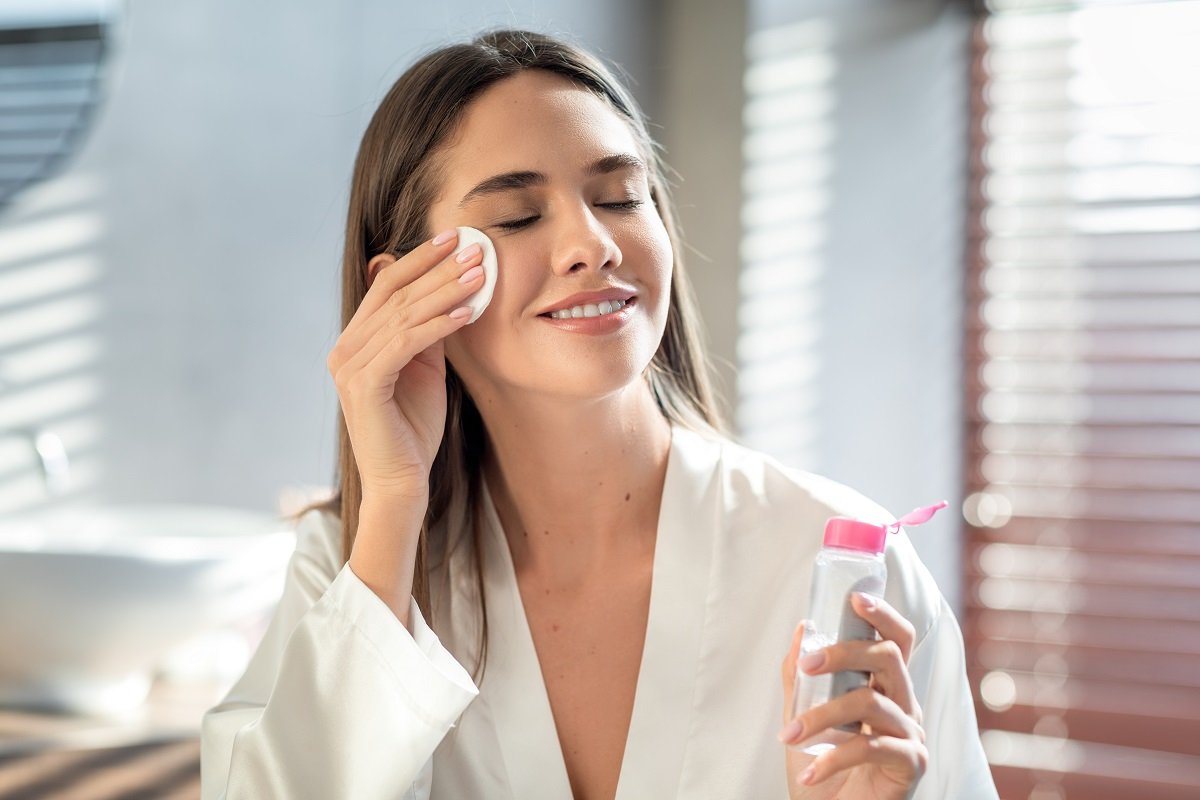After a long day, or an impromptu late evening, it's much easier to get into bed without taking your makeup off. We've all done it—and anyone who says that they've never committed this sin is undoubtedly lying.
You get into bed and think, what harm could it do? It's just one night, and after all, you're way too tired to spend ages taking it all off, cleansing, toning and then moisturizing before climbing back under the sheets.
However, certified cosmetologist-aesthetician Valerie Aparovich has explained that "not removing makeup before sleep is an open invitation for bacteria growth." If bacteria remain on the skin's surface, they can cause acne breakouts, inflammation, and the spread of germs.
Aparovich told Newsweek: "Throughout the day, environmental culprits, including dirt, grime, and bacteria, harbor on the face, getting trapped in the makeup. Mixed with sebum and sweat, makeup residues create a moist environment that is a breeding ground for pathogenic agents' harmful activity.

"Gentle and thorough cleansing is the key to reducing the spread of hazardous bacteria, germs, and fungi on the skin surface and in the pores."
'Sebum and Environmental Dirt Can Clog Pores'
Aparovich, a biochemist for OnSkin, an app that evaluates cosmetic products and their ingredients, explained that while sleeping in makeup might seem convenient, the unhygienic habit allows bacteria, sebum, dirt and grime to remain on the skin.
"The mixture of makeup products, sebum, and environmental dirt can clog pores, resulting in blackheads and whiteheads, inflammatory response, and recurring acne breakouts. Sebaceous glands blocked with impurities are provoked for excessive sebum production, which leads to overly lubricated skin and induces unhealthy shininess."
Sebum, which is secreted by the sebaceous glands, is as an oily substance that protects the skin from drying out. Sebum provides a protective coating for the skin to retain moisture and to protect the skin from infections.
Although sebum is released to protect the skin, it can also lead to pimples, large pores, and greasy hair. Excessive secretion of sebum can cause conditions like acne or hyperplasia to develop, so it's important to keep skin cleansed.
Aparovich continued: "Mascaras, eye shadows, and foundations often contain dyes, preservatives, and other ingredients that are stressful to the skin, with their adverse effects increasing with prolonged contact time. Not removed timely and thoroughly, they can violate the skin's vitality and provoke irritation, rashes, and allergic reactions.
"It's especially essential regarding eye makeup, as eyeliners, mascaras, and eye shadows can clog meibomian glands and cause severe inflammatory conditions, including allergic conjunctivitis and contact dermatitis on delicate skin around the eyes."

'Heavy Makeup Creates A Thick Mantle On The Skin'
Aside from permitting bacteria and dirt to accumulate on the skin, sleeping in makeup overnight can also prevent the skin from breathing and working to repair itself.
"During sleep, the skin experiences the most intense cellular regeneration processes. Makeup and its artificial constituents interfere with the skin renewal processes and disrupt the skin's natural ability to rejuvenate.
"Heavy makeup creates a thick mantle on the skin, making it harder for the cells to breathe and maintain their detoxifying functions. Enabling the makeup residue to stagnate on the skin throughout the night leads to its weakened immune efficacy, and dull complexion."
Aparovich added that when people go to bed wearing makeup, they miss out their usual evening skincare routine, which would normally restore balance and moisturize the skin. In turn, when this isn't carried out, the skin becomes dehydrated and leads to reactions such as peeling, irritation or wrinkling.
"Dehydration can drastically affect all skin types," she said. "As for dry skin, it will result in dryness, peeling, irritation, tightness, and the signs of aging such as wrinkling and dull complexion. As for the oily type, not moisturizing the skin timely and properly can stimulate it to produce even more sebum to hydrate itself, which can provoke inflammation and acne breakouts."
'Regular Sleeping In Makeup Can Cause Severe Skin Damage'
Thankfully for those who mistakenly fall asleep before reaching for the makeup wipes, Aparovich says that one time won't lead to damaging effects.
But, for those repeat offenders who wake up every Sunday morning with last night's makeup on, she implores them to develop a simple skincare routine that they can do without fail.
She said: "Many of us know that leaving makeup on overnight does not feel great, but learning the damage it can induce is a powerful habit-changer. While one night may be harmless, regular sleeping in makeup, especially when wearing heavy foundations, thick primers, and oily products, can cause severe skin damage.
"Develop a convenient and consistent nighttime skincare routine, including makeup removal, cleansing, toning, and moisturizing steps. If you tend to skip your evening skincare regimen due to tiredness, do not postpone it until bedtime. Make time for it right after you arrive home."
You can't always plan for those one-off spontaneous nights, but even just a quick cleanse to remove some makeup will be better than nothing at all. Products like makeup wipes or micellar water can "free your skin from makeup residue," allowing some chance for the skin to breathe overnight.
"Removing all traces of makeup enables the skin's repair mechanisms to work to their full potential.
"If you wear heavy makeup, consider a double-cleansing routine, with cleansing oils and balms as the first step, and water-soluble cleansing foams and gels as the second step, dissolving the remains of any compromising residue from the skin."
Is there a skincare issue that's worrying you? Let us know via health@newsweek.com. We can ask experts for advice, and your story could be featured on Newsweek.
Uncommon Knowledge
Newsweek is committed to challenging conventional wisdom and finding connections in the search for common ground.
Newsweek is committed to challenging conventional wisdom and finding connections in the search for common ground.
About the writer
Alyce Collins is a Newsweek Life and Trends reporter based in Birmingham, U.K. with a focus on trending topics that ... Read more





